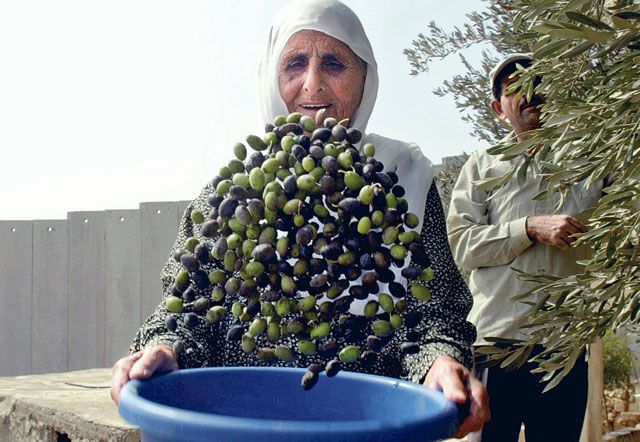For centuries, olive harvesting in Berqin, West Bank, has been a mostly local industry.
Farmers, their relatives and neighbours beat the trees with sticks or strip the olives from branches by hand, then cart them to a local press and sell or trade the oil in nearby markets. Harvest workers keep a share of the crop for their labour and olive press owners keep a share of the oil — a testament to the small-scale, bartered nature of the undertaking.
That model can help sustain a household but in a new factory on the outskirts of this northern West Bank village, an effort is under way to reshape the olive industry so it can help sustain a national economy.
With savvy marketing in the United States and Europe, and fair-trade and organic certifications that attract top dollar from Western consumers, a six-year-old farmers cooperative is breaking some of the traditional bounds of the olive industry and beginning to pull in hard currency from abroad.
The Palestine Fair Trade Association now has 1,200 farmers and 20 olive press owners who take advantage of a guaranteed "fair trade" price from Canaan Fair Trade, an affiliated company set up to market Palestinian-made products abroad. The arrangement means higher prices for the farmers and, perhaps as important, a way to turn the year's crop into a lump sum of cash, rather than the trickle of money many received by selling oil or olives through the year.
Developed by a United States-trained anthropologist, the venture sent 350 tonnes of olive oil to the US and Europe in 2008, about $4 million worth, with projections that the amount could triple in a couple of years. Canaan Fair Trade has become the chief olive oil supplier to the Dr Bronner's Magic Soap company and is breaking into boutique food stores with its own gourmet olive oil brand. There are smaller sales to major grocers such as Whole Foods and Sainsbury's.
"The value is in exports and long-term relationships" with overseas buyers, said Nasser Abu Farha, who returned to the region of his childhood with a doctorate from the University of Wisconsin and an aim to "give a space in modern society" for olive-harvesting families.
Olive trees are an economic and cultural staple of Palestinian society. Ancient stone presses still dot a landscape where some 10 million trees fill terraced hillside groves and rise in impromptu nooks. The harvest season in October and November is a community affair, marked by family gatherings and festivals.
Olives are also the largest Palestinian crop, accounting for more than 40 per cent of the land used for agriculture, according to United Nations figures. But earnings from olive trees are disproportionately low — roughly $120 million in 2008, or 18 per cent of all agricultural production.
International trade officials say that despite the industry's historic roots, it remains underdeveloped and beset by informal practices that limit crop yields.
The domestic focus of the industry has put another clamp on earnings. The same olives whose oil sells for a few dollars a quart locally can be run through the half-a-million dollar Swedish press at Canaan Fair Trade's new plant, put in a bottle with an organic and fair trade certified label and sold for upwards of $50 a quart at retail stores in the US.
Projects such as that are considered critical to boosting the $6 billion Palestinian economy, and trying to lessen its present dependence on international aid.
Israeli Prime Minister Benjamin Netanyahu, who says he wants to improve the West Bank economy and cultivate an "economic peace" regardless of whether talks towards creation of a Palestinian state are progressing, has relaxed some movement restrictions in the area to boost economic activity.
But the effort has been spotty. About 590 checkpoints and barriers remained in and around the West Bank as of late September, according to UN monitors. Checkpoints within the West Bank are still in place to control movement between Palestinian cities: Travellers leaving places such as Nablus through the Huwwara checkpoint can't be certain whether they will pass quickly through a loosely patrolled post, or meet a heavier concentration of troops with a rigorous check.
Palestinian Authority Prime Minister Salam Fayyad said that removing checkpoints and barriers is helpful but does not relieve what he calls the "functional restrictions" on the Palestinian economy — the permit requirements to get capital, labour and goods into and out of Palestinian areas, and, in the case of the olive industry, limits on access to land and water.












